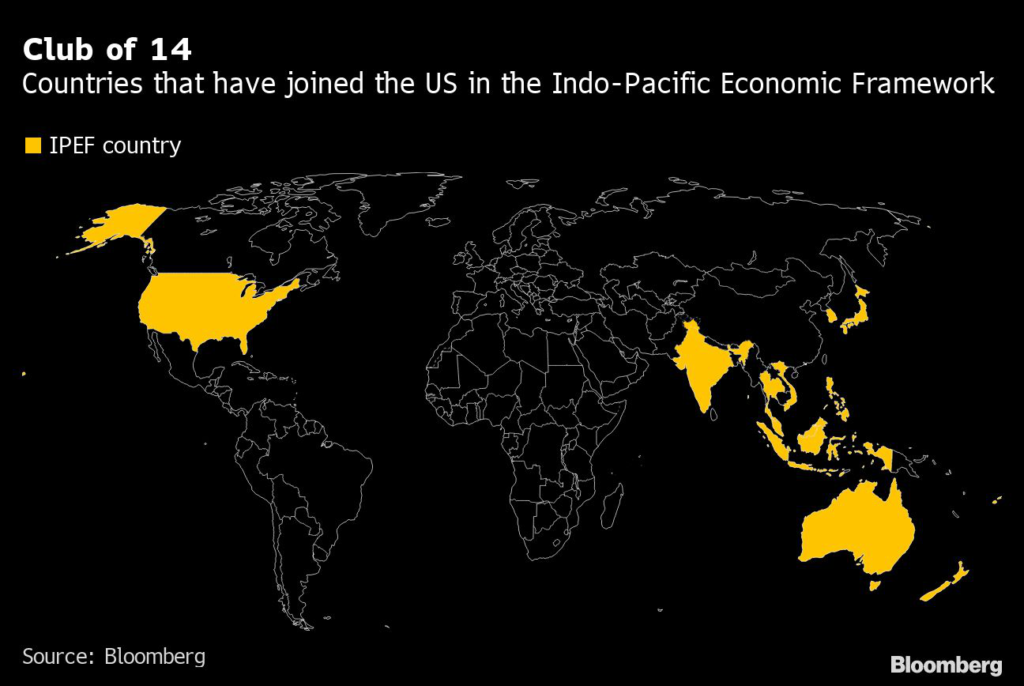(Bloomberg) — The US and Taiwan unveiled a fresh blueprint to deepen their trade relationship focusing on ending forced labor and “harmful non-market policies and practices” as Washington and Beijing vie for sway in the region.
The plan — known as the US-Taiwan Initiative on 21st Century Trade — aims to “develop an ambitious roadmap for negotiations for reaching agreements with high-standard commitments” on areas such as trade facilitation, regulatory practices, agriculture, anti-corruption and supporting small businesses, the Office of the US Trade Representative said in a statement Wednesday.
The Biden administration’s latest effort to assert its position in Asia follows the announcement in May of its Indo-Pacific Economic Framework designed to counter China’s influence in the region. Thirteen nations have signed up to join the US in an effort to advance resilience, fairness, and competitiveness, but neither IPEF — nor Wednesday’s initiative with Taiwan — include any tariff reductions.
The initiative doesn’t require approval from Congress because it doesn’t address market-access issues, but the White House isn’t ruling anything out for the future, a senior administration official said on a call with reporters Tuesday.
The US didn’t invite Taiwan to join the framework, even after more than 50 senators wrote to President Joe Biden last month urging him to include the government in Taipei. The new initiative allows for greater tailoring of the conversation and the unique characteristics of the US-Taiwan trade relationship, the official said, adding that the administration takes an adaptable approach to IPEF participation.
One area of discussion, “harmful” non-market policies and practices, indicates that the US will seek to continue putting pressure on Taiwan’s central bank to halt its interventions in foreign exchange markets aimed at “smoothing” the island’s currency, a long-term point of friction between the two governments.
President Tsai Ing-wen said in a Facebook post that her government looked forward to deepening economic ties with the US and hoped the talks would eventually lead to a bilateral trade agreement, a long-held goal for Taipei.
The US’s interactions with Taiwan are all unofficial and take place through the American Institute for Taiwan and the Taipei Economic and Cultural Representative Office in the US. China’s Communist government protested Washington’s deepening bilateral engagement, including “discussing or signing agreements with implications of sovereignty” with the island, which it regards as part of its territory despite never controlling it.
“If the US insists on playing the Taiwan card, it will only lead China-US relations to a precarious state,” China’s Foreign Ministry spokesman Zhao Lijian said at a briefing in Beijing on Thursday.
The first meeting under the initiative will likely be held later this month in Washington, the USTR said.
The new plan will run in conjunction with other efforts such as the Trade and Investment Framework Agreement, and the Technology, Trade and Investment Collaboration that Commerce Secretary Gina Raimondo on Tuesday said would be restarted.
She described Taiwan as “a critical trading partner” of the US, with the island being a key supplier of microchips that are currently in short supply globally.
The US isn’t the only one seeking closer trading ties with Taiwan. The European Union is set to discuss supply chains, export controls and foreign direct investment in its annual trade and investment talks with Taiwan on Thursday, according to a statement from the Taipei Representative Office in the EU and Belgium.
(Updated with comments from officials in Taiwan and China in seventh, eighth and ninth paragraphs.)
More stories like this are available on bloomberg.com
©2022 Bloomberg L.P.











